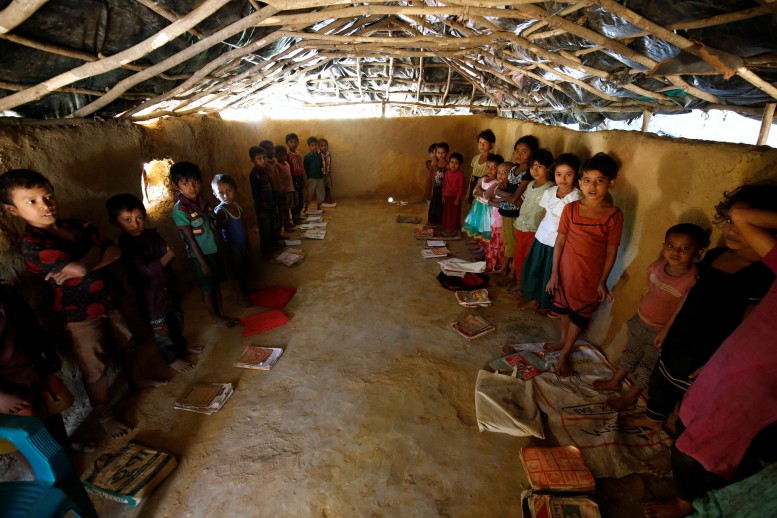Humanitarian access to tightly restricted villages in northern Maungdaw has been granted, coinciding with a visit to Arakan State by the United Nations human rights envoy that began on Friday.
The lifting of the blockade should come as a great relief to aid organisations, which have been unable to attend to scores of villages beyond their reach, despite an announcement by State Counsellor Aung San Suu Kyi last month that all assistance was now welcome.
The UN World Food Programme told DVB it had received permission to distribute supplies to more than 150 villages as of late Friday afternoon. The villages had remained effectively off-limits since violence erupted on 9 October, leaving thousands without access to healthcare and nutrition support.
“The majority of those who will receive assistance are people newly affected by recent events. Distributions have resumed today [Friday], initially targeting 30,000 of the most affected people subject to continuous needs assessments,” said Silke Buhr, the WFP communications officer for the Asia and Pacific bureau.
At the time of publication, DVB was unable to independently confirm the extent to which other areas in northern Arakan State remain restricted.
The UN and other rights groups had been forewarning a drastic spike in malnutrition rates in the region, contradicting reports in state media that hunger was a non-issue due to Arakan State’s “favourable fishing conditions.”
More than 65,000 Rohingya Muslims fled conflict-torn northern Arakan State in recent months, seeking shelter across the border in Bangladesh, according to startling figures released by the United Nations earlier this week.
According to the United Nations Office for the Coordination of Humanitarian Affairs (UNOCHA), one-third of the 65,000 had been tallied in the last week, with the bulk of new refugees registering in camps in Cox’s Bazar. The data comes from monitoring done by the International Organization for Migration operating in Bangladesh.
Coordinated attacks on police outposts on 9 October sparked a furious crackdown by Burmese security forces, in what the government termed “clearance operations” aimed at hunting down the alleged perpetrators, but human rights groups have said that Rohingya civilians have borne the brunt of the consequences.
The United Nations Central Emergency Response Fund has allocated $3 million to support the displaced population, many of whom suffer malnutrition and other preventable illnesses.
An International Organisation for Migration spokesperson, who requested anonymity, said it was the “increased ability” of humanitarian agencies to carry out their work in Cox’s Bazaar that accounted for the dramatic jump in the number of Rohingya refugees.
“Initially the new arrivals were dispersed amongst the host community, mostly hiding in the forests and little villages in and around Cox’s Bazar district, too scared to make themselves known in case there would be repercussions. Also many were not aware of the services available in the district, nor the agencies providing assistance and did not know who they could trust,” the spokesperson said.
“As time has gone by and we have been able to extend our humanitarian assistance to the new arrivals without discrimination or negative consequences, people are more trustful to come to the areas where services [in particular food assistance, shelter and healthcare] are available. That is not to say that daily border crossings are not taking place also, but the numbers are a trickle in comparison.”
Allegations of gross human rights violations have marred the Burmese government’s claim that police and the military are behaving lawfully in the course of their clearance operations.
Satellite imagery released by New York-based Human Rights Watch showed scores of Rohingya homes were burnt to the ground, and women and girls have told rights organisations they were systematically raped by the military.
Last week a government-appointed commission tasked with investigating the allegations published an interim report of its findings, claiming its inquiries revealed no evidence to support accusations of abuse.
State media has repeatedly denied all allegations of human rights violations, barring leaked footage in which police beat detained Muslim villagers. An investigation into the beatings was announced by the President’s Office early this month, amid claims the incident was a one-off.
The government, led by Nobel laureate Aung San Suu Kyi, insists the insurgency is being combated in accordance with the rule of law and without risk to the local Muslim population.
[related]
Despite Suu Kyi’s announcement welcoming aid to the region in December, rights and health groups maintained that access to northern parts of Maungdaw was completed restricted.
Yanghee Lee, the UN special rapporteur on human rights in Burma, began a 12-day visit to the country on 9 January, in part to probe the alleged human rights abuses in Arakan State.
Meetings in Naypidaw and Rangoon were also on the agenda, as well as visits to Kachin and Mon states.
The UN envoy has not enjoyed a warm reception in past visits. The Buddhist nationalist group Ma Ba Tha has staged rallies against her, with the extremist movement’s most prominent figurehead Wirathu going so far as to brand her a “whore” for her criticism of a four-piece legislative package endorsed by the group in 2015.



